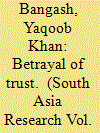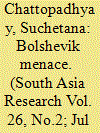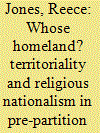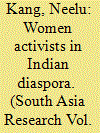| Srl | Item |
| 1 |
ID:
075668


|
|
|
|
|
| Publication |
2006.
|
| Summary/Abstract |
This article analyses why and how the princely order, once considered the bulwark of British rule, came tumbling down so rapidly within a few months in 1947, following the intervention of Lord Mountbatten, a royal cousin, who the princes thought would support them in preserving their rule and privileges. How far were the princes themselves to blame and what role did Mountbatten play? Through a careful re-examination of available sources this article argues that the princes, though unable to act together, trusted the British Crown to protect their rights and interests as promised, but were mistaken in believing that Mountbatten would uphold Britain's treaty obligations regarding the princely states.
|
|
|
|
|
|
|
|
|
|
|
|
|
|
|
|
| 2 |
ID:
075667


|
|
|
|
|
| Publication |
2006.
|
| Summary/Abstract |
This article examines the impact of the anti-Bolshevik surveillance network created by the colonial state on the urban political milieu of Calcutta during the late 1910s and the early 1920s. The first socialists in Calcutta (1921-24), predominantly Muslims, emerged from the ranks of urban intellectuals and political activists. The article argues that the state's insistence on labelling various social and political segments, including early socialists, as political tools of Moscow demonstrated its inability to grasp the local responses to an international current. It is shown that despite enforcement of various strategies, which tried to anticipate and prevent the spread of socialism, the colonial state failed to counter the emergence of the left in the city.
|
|
|
|
|
|
|
|
|
|
|
|
|
|
|
|
| 3 |
ID:
075665


|
|
|
|
|
| Publication |
2006.
|
| Summary/Abstract |
The friendly ties of the Anglo-Portuguese alliance in Europe were hardly in evidence in the Indian context even in the second half of the 18th century. The Marquez Alorna's note to his successor Viceroy of Goa, in 1751, listed the French as a friend and the English as an enemy in India. Towards the end of the century, though, relations took a dramatic turn towards close ties of amity and cooperation between England and Portugal.
This article examines crucial changes during the Viceroyalty of Sr Francisco Antonio da Veiga Cabral (1794-1807) when Anglo-Portuguese relations entered a new phase of assistance and adjustment through the introduction of a British auxiliary force into Goa, by a process of super-imposition rather than supercession. In this atmosphere of friendship and amity, cooperation covered the fields of defence, administration, trade protection and political affairs.
The article specifically studies documentary evidence related to how the Portuguese frigate Real Fidelissimo was spared by the Portuguese Viceroy for service in a British expedition to the Red Sea in 1801. Even a temporary integration of the Portuguese European troops into British pay and a joint command of all the Portuguese and British troops in Goa, under a British Commanding Officer, were possible in that ambience.
|
|
|
|
|
|
|
|
|
|
|
|
|
|
|
|
| 4 |
ID:
075664


|
|
|
|
|
| Publication |
2006.
|
| Summary/Abstract |
Scholarly inquiries into communalism in South Asia have often exclusively focused on politically constructed religious and ethnic identity categories. This article challenges these assumptions by arguing that territoriality and the designation of homelands played an important, but largely unrecognized, role in developing social and political boundaries in the region. By analyzing the writings of Bipin Chandra Pal during the Swadeshi period, this article points to the territorialization of a Hindu-based version of the national homeland as a key process in the development of communal difference in Bengal and South Asia more generally. It is concluded that the Hindu-dominated rhetoric of the early nationalist movement implicitly marked Hindus as the only true members of the nation. By implicitly excluding all other forms of social affiliations from the narrative of the homeland, it is argued that the stage was set for the contestation of territorial identity categories that played out through the 20th century in Bengal.
|
|
|
|
|
|
|
|
|
|
|
|
|
|
|
|
| 5 |
ID:
075666


|
|
|
|
|
| Publication |
2006.
|
| Summary/Abstract |
The article presents the voices and concerns of activist women in the Indian diaspora in Canada who, faced with much evidence of domestic and sexual violence against women, have begun to analyse domestic violence and their own roles in combating it. The article explores different ways in which women activists have struggled in an alien land to raise the issue of Indian women being subjected to forms of violence that seem magnified by the vulnerable position of immigrant women who lack a secure residence status. While there have been notable achievements, huge challenges remain, both within the South Asian community structures as within wider Canadian society and mainstream feminist discourses.
|
|
|
|
|
|
|
|
|
|
|
|
|
|
|
|